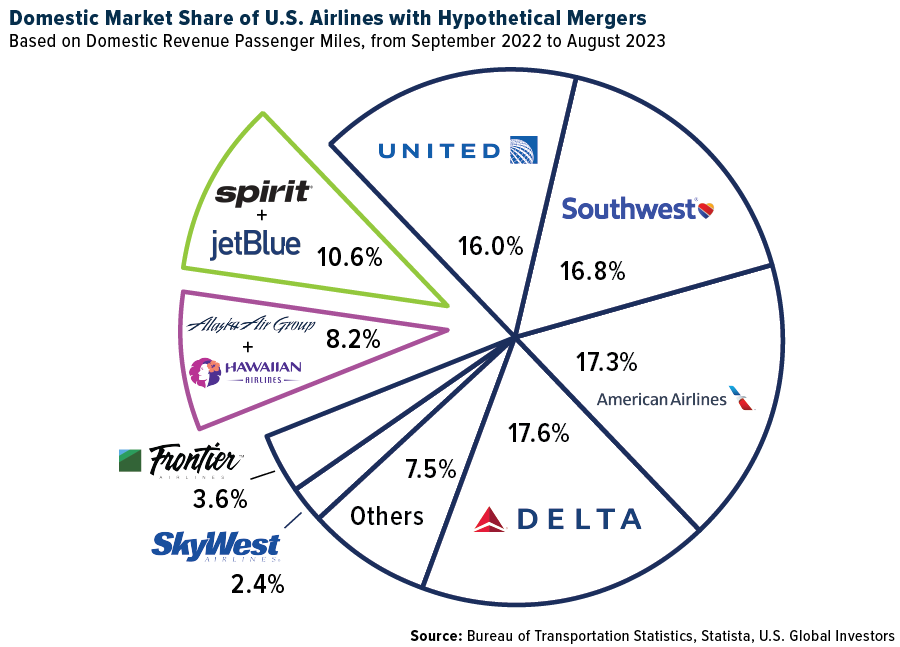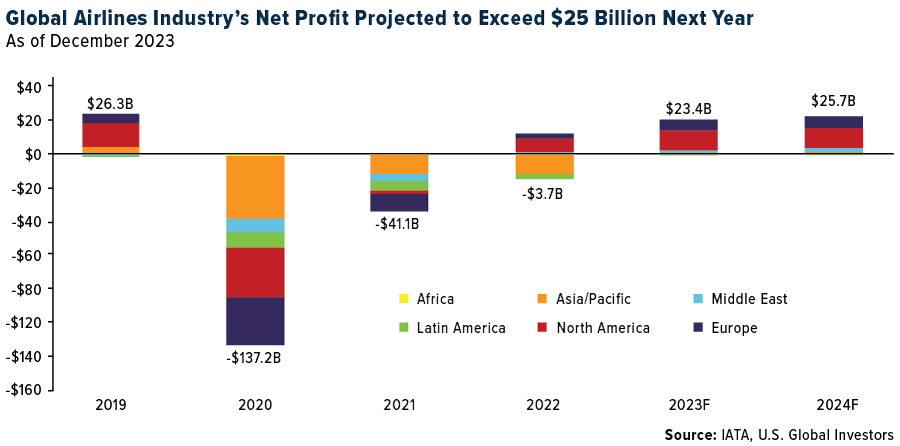[ad_1]
Airline consolidation is just not solely comparatively frequent however vital for development and competitiveness, and the latest announcement of Alaska Airways’ (NYSE:) deliberate acquisition of Hawaiian Airways (NASDAQ:) is a primary instance of this development.
The transfer, valued at $1.9 billion, signifies greater than only a enterprise transaction. It represents a strategic positioning for future development in a extremely aggressive, extremely concentrated sector.
As soon as the deal is accomplished, Alaska and Hawaiian could have a mixed market share of roughly 8.2%, making it the fifth-largest U.S. airline—except JetBlue Airways (NASDAQ:) succeeds in getting regulatory approval to accumulate rival low-cost provider Spirit Airways (NYSE:). Extra on that later.

Alaska’ supply to buy Hawaiian for $18 per share—immediately it’s buying and selling round $13—consists of taking up $900 million in debt, however the potential benefits are substantial. The Washington State-based provider not solely features a major foothold within the profitable, $18 billion Hawaii market but in addition achieves a number of strategic advantages:
Capability Rationalization: The deal permits for higher competitors with Southwest Airways (NYSE:) by rationalizing capability between the West Coast and Hawaii.
Fleet Growth and Flexibility: Alaska will purchase widebody plane for long-haul flights and improve fleet flexibility for various route choices.
Enhanced Community Utilization: The merger guarantees improved utilization of enormous narrowbody plane throughout the mixed networks.
The announcement despatched Hawaiian’s dad or mum firm shares hovering 193% final Monday, reflecting the market’s optimistic view of the deal. This constructive response underscores a broader development within the airline trade, the place smaller gamers search mergers to remain aggressive towards bigger rivals.
JetBlue’s Case to Purchase Spirit
Parallel to the Alaska-Hawaiian deal, JetBlue formally wrapped its case in federal courtroom final week to accumulate Spirit for $3.8 billion. If authorized, the deal would reshape the U.S. airline trade, doubtlessly difficult the dominance of the 4 main carriers and marking essentially the most vital occasion of airline consolidation for the reason that American-US Airways merger in 2013.
In accordance with Evercore ISI’s Duane Pfennigwerth, who was current for closing arguments on Wednesday, the decide’s line of questioning “learn favorably for a settlement,” and JetBlue appeared to have “a extra cohesive argument [than the Justice Department], which required much less clarification by the decide.”
Among the many most compelling arguments made by JetBlue attorneys is that the New York-based provider requires scale to develop and compete towards the Large 4 airways. Smaller opponents are anticipated to fill the gaps created by an outgoing Spirit, which JetBlue insists can’t make it alone within the present market anyway.
The Justice Division is just not so certain. The company claimed {that a} JetBlue-Spirit merger would wipe out half of all ultra-low-cost provider (ULLC) capability within the U.S., trusted by many price-conscious Individuals. Additional,
“Spirit anchors pricing in bigger markets and is an innovator, with self-service bag drops an instance of a latest innovation,” writes Pfennigwerth, summarizing the Justice Division’s line of reasoning.
A call is predicted as early as this week.
Again to the Lengthy-Time period Common
Home airline shares rallied final week on the constructive information, with the NYSE Arca Airways Index closing up practically 13% from the earlier Friday. This represents the biggest weekly acquire for the group since November 2020.
Taking time from its courtroom case in Boston, JetBlue raised its monetary outlook for 2023, with anticipated annual income development of 4% to five%, up from earlier steerage of three% to five%, and a smaller-than-anticipated adjusted loss. This uplift is buoyed by robust bookings and operational efficiency.
Delta Air Strains reported strong vacation journey demand and rising company bookings, projecting a shiny finish to 2023 and stable starting to 2024. Talking on the Morgan Stanley International Client & Retail Convention, Delta CEO Ed Bastian doubled down on the provider’s constructive 2023 steerage, citing report revenues for the Thanksgiving vacation. Christmas bookings look to be “very, very robust,” Bastian stated.
Throughout his presentation, Bastian shared an fascinating chart that exhibits that air journey as a p.c of gross home product (GDP) has returned to the long-term common. Since 1980, quickly after deregulation, industrial air journey expenditure has traditionally averaged round 1.3% of the U.S. financial system, with notable deviations occurring because of 9/11 and the 2009 monetary disaster. Nevertheless, essentially the most vital disruption was through the pandemic, leading to roughly $300 billion of misplaced demand from 2020 to 2022.

The latest journey increase, Bastian identified, is a response to pent-up demand, although it’s solely introduced the trade again to the 1.3% common with out addressing the lacking $300 billion hole. Bastian expects to recoup this quantity over the subsequent few years as demand stays close to or above current ranges.
IATA Forecasts Report Working Earnings in 2024
On a remaining, encouraging be aware, the Worldwide Air Transport Affiliation (IATA) forecasts internet earnings of $25.7 billion for the worldwide airline trade in 2024, with working earnings reaching a report $49.3 billion. North American carriers, which had been first to return to profitability in 2022, are set to gather a mixed $14.4 billion in earnings, the IATA says.
This projection, coupled with an anticipated surge in passenger visitors, paints an image of an trade on the cusp of a historic rebound.

The airline trade’s journey by means of the pandemic was fraught with challenges, however its fast return to profitability is a testomony to its resilience and flexibility. Because the Alaska-Hawaiian and JetBlue-Spirit offers take form, it’s clear that the trade is not only recovering however is actively reshaping itself for a brand new period of development and competitors.
***
Disclaimer: Holdings might change every day. Holdings are reported as of the latest quarter-end. The next securities talked about within the article had been held by a number of accounts managed by U.S. International Buyers as of (09/30/2023): JetBlue Airways Corp., United Airways Holdings (NASDAQ:) Inc., Alaska Air (NYSE:) Group Inc., Hawaiian Holdings (NASDAQ:) Inc., Southwest Airways Co., American Airways (NASDAQ:) Group Inc., Delta Air Strains Inc (NYSE:)., SkyWest (NASDAQ:) Inc., Frontier Group Holdings Inc.
All opinions expressed and knowledge supplied are topic to vary with out discover. A few of these opinions might not be acceptable to each investor. By clicking the hyperlink(s) above, you’ll be directed to a third-party web site(s). U.S. International Buyers doesn’t endorse all info provided by this/these web site(s) and isn’t answerable for its/their content material.
[ad_2]
Source link





